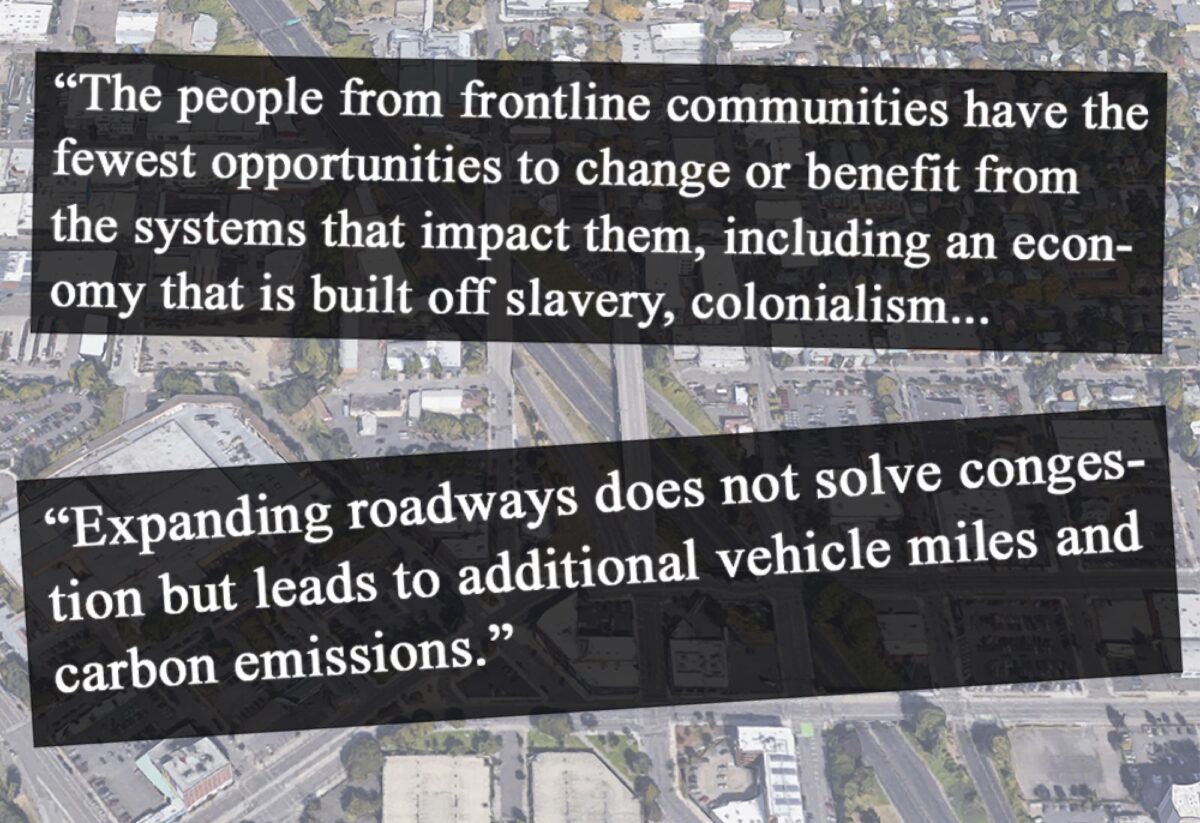In normal times, major changes to important policy documents happen at a glacial pace. These are not normal times.
When Portland Mayor Ted Wheeler released a draft of the city’s Climate Emergency Declaration back in mid-February it was just under 1,800 words long. The one that will get a public hearing and vote tonight (6/30) is nearly 5,000 words long.
The new document reflects the urgency of two crises — the Covid-19 pandemic and the fight to end racism and police brutality. The declaration now includes stronger language about the climate impacts of transportation policy and it puts the blame for current inequities and remedy for solving them in the future on the pervasive impacts of systemic racism.
Like all official city declarations, the document is made up of two types of statements: “Whereas” statements describe existing conditions and “Be it resolved” statements describe actions the City will take to address them. The initial draft had 17 whereas statements and 20 resolutions. The new draft has 26 whereas statements and 34 resolutions.
Many of the additions have to do with who is impacted by climate change, why it hurts some more than others, and who will have power as we fight against it:
For example, the second whereas statement used to read:
… the people from frontline communities have the least opportunities to change or benefit from the systems that impact them, including the extractive economy.
And it now reads (additions in bold):
… the people from frontline communities have the fewest opportunities to change or benefit from the systems that impact them, including an economy that is built off slavery, colonialism, and the unsustainable extraction of natural resources, and they must be the ones that benefit first from the transition to a clean energy economy and be able to lead the planning and implementation efforts to address climate change.
Advertisement
The initial draft barely touched on transportation, but the new draft includes these new statements:
… expanding roadways does not solve congestion but leads to additional vehicle miles and carbon emissions; and investing in permanent affordable housing near transit lines in urban, suburban, and rural areas reduces carbon emissions and delivers greater environmental, economic, health, and social benefits…
Another statement (not included in initial draft) directly addresses freeway expansions:
Be it further resolved, that the Portland City Council [missing word?] on freeway facilities in Portland before approving additional lane-miles and Portland will evaluate and advance equitable congestion pricing strategies within existing roadway will require the Oregon Department of Transportation to include dynamic pricing capacity in Portland; and
It’s not clear if that statement would apply only to future projects or if the City of Portland has the ODOT-led I-5 Rose Quarter project in mind. In a summary of the declaration released on Friday by the Bureau of Planning & Sustainability, they said that statement on “freeway facilities”, “Requires ODOT to put dynamic pricing is [sic] in place on freeways before Portland City Council will approve additional lane miles.”
The City of Portland finds itself in the awkward position of being a partner with the State of Oregon on this very controversial $800 million mega-project that will expand I-5 and exacerbate many of the negative impacts the freeway had on Portland’s largest Black community when it was first built in the 1970s. Recent committee meetings about the project revealed weakening support and increased ODOT skepticism in the wake of protests over the death of George Floyd.
When it comes to promised actions, the declaration has several key additions that relate directly to transportation.
The new version includes this promise about a “green infrastructure action plan”:
Be it resolved that Bureau of Environmental Services, the Bureau of Planning and Sustainability, Portland Parks & Recreation, and Portland Bureau of Transportation are directed to collaborate on the creation of a citywide integrated and prioritized green infrastructure action plan to: 1) help achieve the goal of a healthy connected city for all; 2) maximize the benefits of green infrastructure investments in reducing carbon emissions and preparing for climate change impacts; and 3) build on, connect and enhance the existing network of green infrastructure initiatives being led by community, non-profits, businesses, and other governments.
In related news, Multnomah County has released their final progress report on the 2015 Climate Action Plan, saying, “future iterations of climate planning will go beyond a focus on equity, to have a more explicit focus on climate justice and centering the voices of front line communities.”
Portland City Council will host a virtual public hearing and vote on the Climate Emergency Declaration today (Tuesday, 6/30) night from 6:30 to 8:30 pm.
— Jonathan Maus: (503) 706-8804, @jonathan_maus on Twitter and jonathan@bikeportland.org
— Get our headlines delivered to your inbox.
— Support this independent community media outlet with a one-time contribution or monthly subscription.


